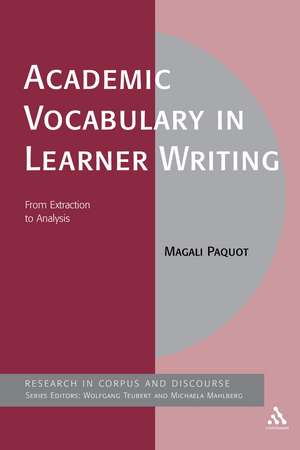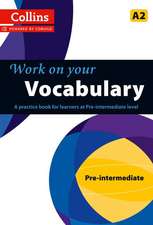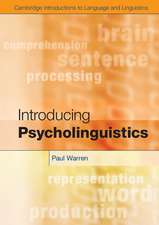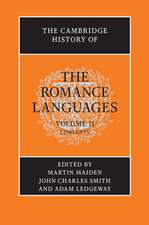Academic Vocabulary in Learner Writing: From Extraction to Analysis: Corpus and Discourse
Autor Magali Paquoten Limba Engleză Paperback – 22 feb 2012
In the second part, the author offers a thorough analysis of academic vocabulary in the International Corpus of Learner English (ICLE) and describes the factors that account for learners' difficulties in academic writing. She then focuses on the role of corpora, and more particularly, learner corpora, in EAP material design. It is the first monograph in which Granger's (1996) Contrastive Interlanguage Analysis is used to compare 10 ICLE learner sub-corpora, in order to distinguish between linguistic features that are shared by learners from a wide range of mother tongue backgrounds and unique features that may be transfer-related.
| Toate formatele și edițiile | Preț | Express |
|---|---|---|
| Paperback (1) | 258.42 lei 43-57 zile | +94.17 lei 5-11 zile |
| Bloomsbury Publishing – 22 feb 2012 | 258.42 lei 43-57 zile | +94.17 lei 5-11 zile |
| Hardback (1) | 1008.43 lei 43-57 zile | |
| Bloomsbury Publishing – 21 iul 2010 | 1008.43 lei 43-57 zile |
Din seria Corpus and Discourse
-
 Preț: 179.36 lei
Preț: 179.36 lei -
 Preț: 169.35 lei
Preț: 169.35 lei -
 Preț: 168.91 lei
Preț: 168.91 lei - 23%
 Preț: 197.86 lei
Preț: 197.86 lei - 13%
 Preț: 229.59 lei
Preț: 229.59 lei - 13%
 Preț: 257.50 lei
Preț: 257.50 lei - 22%
 Preț: 1064.84 lei
Preț: 1064.84 lei - 23%
 Preț: 199.03 lei
Preț: 199.03 lei - 18%
 Preț: 304.94 lei
Preț: 304.94 lei - 14%
 Preț: 1008.59 lei
Preț: 1008.59 lei - 13%
 Preț: 257.59 lei
Preț: 257.59 lei - 22%
 Preț: 258.24 lei
Preț: 258.24 lei - 22%
 Preț: 224.29 lei
Preț: 224.29 lei - 22%
 Preț: 258.15 lei
Preț: 258.15 lei - 21%
 Preț: 218.91 lei
Preț: 218.91 lei - 30%
 Preț: 570.76 lei
Preț: 570.76 lei - 19%
 Preț: 495.61 lei
Preț: 495.61 lei - 11%
 Preț: 375.61 lei
Preț: 375.61 lei - 8%
 Preț: 299.86 lei
Preț: 299.86 lei - 19%
 Preț: 344.75 lei
Preț: 344.75 lei - 22%
 Preț: 257.68 lei
Preț: 257.68 lei - 13%
 Preț: 257.97 lei
Preț: 257.97 lei - 22%
 Preț: 258.77 lei
Preț: 258.77 lei - 28%
 Preț: 374.34 lei
Preț: 374.34 lei - 14%
 Preț: 570.02 lei
Preț: 570.02 lei - 30%
 Preț: 569.13 lei
Preț: 569.13 lei - 22%
 Preț: 1125.24 lei
Preț: 1125.24 lei - 14%
 Preț: 298.74 lei
Preț: 298.74 lei - 22%
 Preț: 1008.01 lei
Preț: 1008.01 lei
Preț: 258.42 lei
Preț vechi: 331.65 lei
-22% Nou
Puncte Express: 388
Preț estimativ în valută:
49.45€ • 51.77$ • 40.92£
49.45€ • 51.77$ • 40.92£
Carte tipărită la comandă
Livrare economică 07-21 aprilie
Livrare express 28 februarie-06 martie pentru 104.16 lei
Preluare comenzi: 021 569.72.76
Specificații
ISBN-13: 9781441114501
ISBN-10: 1441114505
Pagini: 256
Dimensiuni: 156 x 234 x 15 mm
Greutate: 0.41 kg
Editura: Bloomsbury Publishing
Colecția Continuum
Seria Corpus and Discourse
Locul publicării:London, United Kingdom
ISBN-10: 1441114505
Pagini: 256
Dimensiuni: 156 x 234 x 15 mm
Greutate: 0.41 kg
Editura: Bloomsbury Publishing
Colecția Continuum
Seria Corpus and Discourse
Locul publicării:London, United Kingdom
Caracteristici
There is no learner-corpus study which is based on such a large database of learner academic writing
Notă biografică
Magali Paquot is a post-doctoral researcher at the Centre for English Corpus Linguistics, Université catholique de Louvain, Belgium
Cuprins
Acknowledgements List of abbreviations Introduction Section 1: Academic Vocabulary 1. What is academic vocabulary? 2. A data-driven approach to the selection of academic vocabulary Section 2: Learners' Use of Academic Vocabulary 3. Investigating learner language 4. Rhetorical functions in expert academic writing 5. Academic vocabulary in the International Corpus of Learner EnglishSection 3: Implications and Conclusions6. Pedagogical implications 7. General conclusion References Appendix Subject index Author index
Recenzii
"One of the most controversial issues in EAP curriculum development is the question of whether the focus of instruction should be geared toward general academic instruction or toward discipline-specific features. The work of Magali Paquot shows that there exists a culture of academic literacy signalled by a range of non-technical vocabulary which can be used by undergraduate students in diverse disciplines, particularly those words or phrases for marking major academic functions, such as defining, exemplifying, classifying, and reporting the viewpoints of other scholars. This book holds important implications for teachers of academic writing to all novice writers, both native and non-native. The findings the author has presented should be incorporated into materials development for undergraduate teaching."
The book is well organized... is definitely a reference and a source of ideas for teaching EFL as well as for designing teaching materials.
... this book effectively addresses a range of relevant issues in investigating academic vocabulary in learner writing. The book will appeal to researchers, scholars and graduate students who are interested in conducting research studies in this field. The volume could also be used in graduate level classes, especially doctoral seminars, on discourse studies and corpus linguistics.
The book is well organized... is definitely a reference and a source of ideas for teaching EFL as well as for designing teaching materials.
... this book effectively addresses a range of relevant issues in investigating academic vocabulary in learner writing. The book will appeal to researchers, scholars and graduate students who are interested in conducting research studies in this field. The volume could also be used in graduate level classes, especially doctoral seminars, on discourse studies and corpus linguistics.










